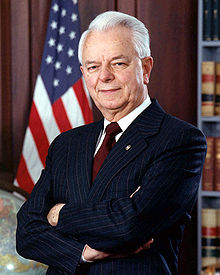US Senator Robert Byrd dies at age 92
Tuesday, June 29, 2010
Senator Robert Byrd, the longest serving member of the United States Congress, died yesterday at the age of 92.

Image: United States Senate.
A spokesman for the Democratic Senator from the state of West Virginia said Byrd had been hospitalized since last week. At first he was thought to have been suffering from heat exhaustion and severe dehydration but other medical conditions developed. On Sunday, his condition was described as "serious".
Byrd was first elected to the U.S. House of Representatives in 1952 and to the U.S. Senate in 1958. He suffered from ill health in recent years but retained his reputation for securing millions in federal funding for his home state.
Throughout his career in the U.S Senate he held positions including Senate Majority Whip, Majority Leader twice and Minority Leader once. Due to his status as the longest serving Senator, Byrd was serving as President pro tempore of the United States Senate, which made him third in line in the Presidential line of succession. Senator Daniel Inouye of Hawaii has been sworn in as the new President pro tempore.
Byrd served nine terms in the Senate and was labeled by critics as the "King of Pork". He used his former chairmanship of the Senate Appropriations Committee to steer over one billion dollars in federal aid to West Virginia, one of the poorest states in the country, described by him as, "one of the rock bottomest [sic] of states".
Byrd took the title to heart and had no apologies about it, saying, "Pork, to the critic, is service to the people who enjoy some of the good things in life, and I've been happy to bring to West Virginia the projects to which they refer. I have no apology for it."
Byrd was originally born as Cornelius Calvin Sale, Jr. on November 20, 1917. He grew up in the coal mining regions of southern West Virginia with his aunt and uncle, who adopted him following the death of his mother in the 1918 flu pandemic. He was the valedictorian of his high school class, but could not afford college and did not attend university courses until his 30s and 40s.
The Senator had a fondness for history, and included excerpts of poetry, Shakespeare, Greek and Roman classics along with verses from the Bible in his Senate speeches. He considered himself a staunch defender of United States Constitution, and carried a copy of it in his pocket. Byrd was versed in parliamentary procedure using some of the Senate's arcane rules to his advantage. He received awards from the American Historical Association and the Organization of American Historians for significant contributions to history.
Byrd had his share of controversy. He was at one time a member of the Ku Klux Klan, serving as the top officer of his local chapter and once held racial segregationist views. Byrd was involved in the filibuster against the landmark Civil Rights Act of 1964, which he voted against. Byrd later explicitly and repeatedly denounced his former segregationist views.
Byrd is the only Senator to have voted against the nominations of African-American Supreme Court justices Thurgood Marshall and Marshall's successor following his retirement, Clarence Thomas. Byrd's opposition of Thomas was based on the testimony of Anita Hill who accused Thomas of sexually harassing her and due to the fact that Byrd felt Thomas was "injecting racism" into the debate by using the phrase "high-tech lynching of uppity blacks" in his defense against the allegations.
Byrd, who supported the Vietnam War, was one of the most outspoken critics of the War in Iraq. He voted against the Iraq War Resolution. Byrd spoke on the eve the invasion saying, "Today I weep for my country. [...] No more is the image of America one of strong, yet benevolent peacekeeper. The image of America has changed. Around the globe, our friends mistrust us, our word is disputed, our intentions are questioned. Instead of reasoning with those with whom we disagree, we demand obedience or threaten recrimination."
Sources
- "Robert Byrd, longest-serving member of Congress, dead at 92" — CNN, June 28, 2010
- Adam Clymer. "Robert C. Byrd, a Pillar of the Senate, Dies at 92" — New York Times, June 28, 2010
- Deborah Tate. "Longest Serving U.S. Senator, Robert Byrd, Dies" — Voice of America, June 28, 2010


